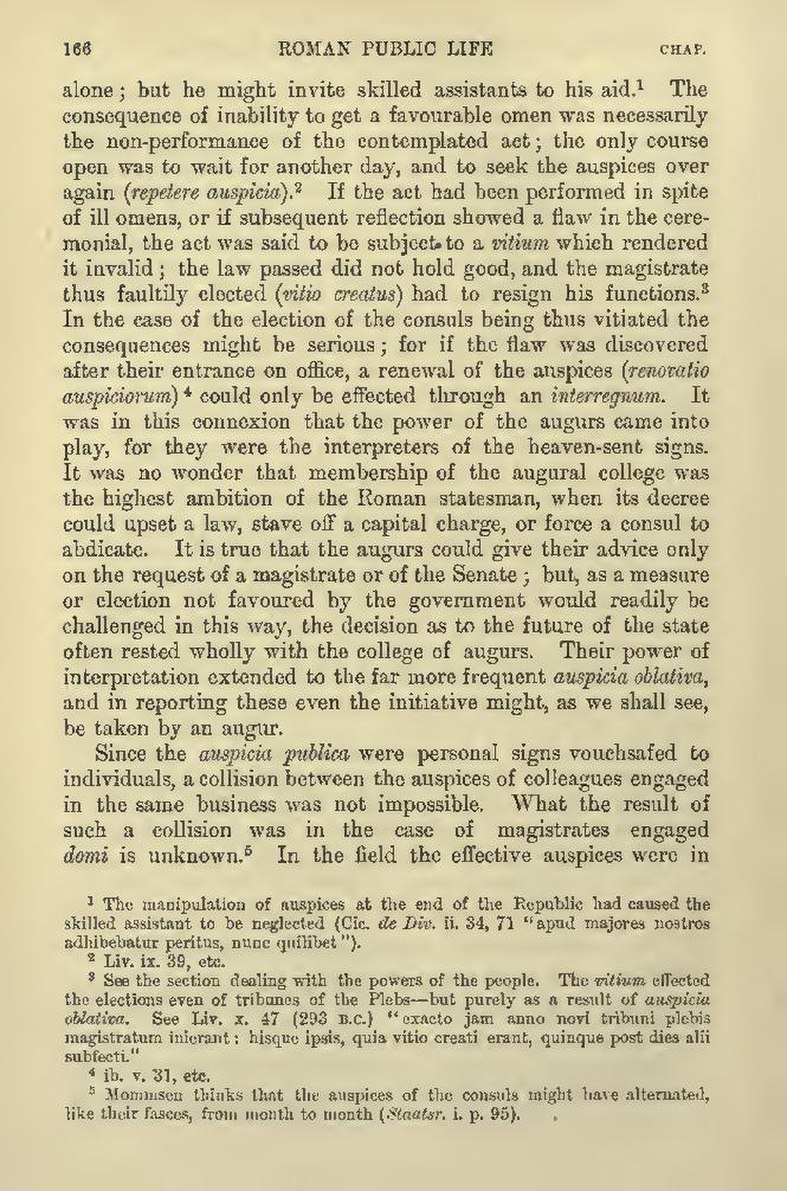alone; but he might invite skilled assistants to his aid.[1] The consequence of inability to get a favourable omen was necessarily the non-performance of the contemplated act; the only course open was to wait for another day, and to seek the auspices over again (repetere auspicia).[2] If the act had been performed in spite of ill omens, or if subsequent reflection showed a flaw in the ceremonial, the act was said to be subject to a vitium which rendered it invalid; the law passed did not hold good, and the magistrate thus faultily elected (vitio creatus) had to resign his functions.[3] In the case of the election of the consuls being thus vitiated the consequences might be serious; for if the flaw was discovered after their entrance on office, a renewal of the auspices (renovatio auspiciorum)[4] could only be effected through an interregnum. It was in this connexion that the power of the augurs came into play, for they were the interpreters of the heaven-sent signs. It was no wonder that membership of the augural college was the highest ambition of the Roman statesman, when its decree could upset a law, stave off a capital charge, or force a consul to abdicate. It is true that the augurs could give their advice only on the request of a magistrate or of the Senate; but, as a measure or election not favoured by the government would readily be challenged in this way, the decision as to the future of the state often rested wholly with the college of augurs. Their power of interpretation extended to the far more frequent auspicia oblativa, and in reporting these even the initiative might, as we shall see, be taken by an augur.
Since the auspicia publica were personal signs vouchsafed to individuals, a collision between the auspices of colleagues engaged in the same business was not impossible. What the result of such a collision was in the case of magistrates engaged domi is unknown.[5] In the field the effective auspices were in
- ↑ The manipulation of auspices at the end of the Republic had caused the skilled assistant to be neglected (Cic. de Div. ii. 34, 71 "apud majores nostros adhibebatur peritus, nunc quilibet").
- ↑ Liv. ix. 39, etc.
- ↑ See the section dealing with the powers of the people. The vitium effected the elections even of tribunes of the Plebs—but purely as a result of auspicia oblativa. See Liv. x. 47 (293 B.C.) "exacto jam anno novi tribuni plebis magistratum inierant: hisque ipsis, quia vitio creati erant, quinque post dies alii subfecti."
- ↑ ib. v. 31, etc.
- ↑ Mommsen thinks that the auspices of the consuls might have alternated, like their fasces, from month to month (Staatsr. i. p. 95).
